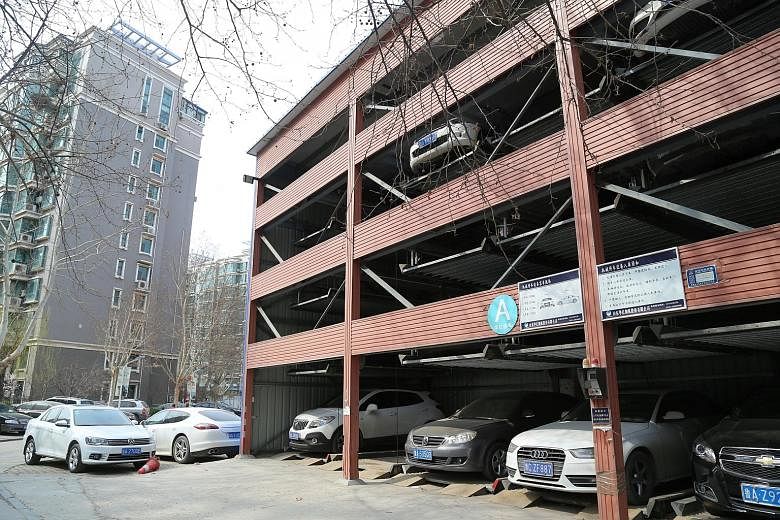HONG KONG • The cost of carparking spaces in new apartment projects in some Chinese cities is soaring as developers roll out their latest secret weapon to counter home-price caps imposed by the municipal authorities.
As if contending with sky-high homes prices wasn't enough, some buyers are now forced to fork out as much as one million yuan (S$210,000) for carparking spaces in major second-tier cities such as Tianjin, Xiamen, Hangzhou, Nanjing and Suzhou. They are sold with an apartment worth as little as 2.4 million yuan, in bundled deals that make it compulsory for residents to purchase the parking space.
"There's a price cap on apartments, but not on parking spaces, so we're bundle-selling them with apartments to compensate," said a Shanghai-based developer, who declined to be identified due to the sensitivity of the issue.
"Recently we sold parking spaces in Xiamen for over one million yuan each. Last year one cost only less than 200,000 yuan," he said, referring to spaces in the port city in Fujian province in south-east China.
To fend off speculators and defuse a housing bubble, major cities across China have slapped a series of restrictions on property markets, including imposing limits on developers' selling prices.
That has prompted property companies to find ways to ride out the tightening measures or skirt them, including delaying the launch of new home sales in the hope that when the authorities relax some rules, buyers will jump back into the market and they can release more supply at higher prices.
Top-tier cities such as Shanghai and Beijing have seen a surge in carpark prices in the past three to five years, with some asking prices over one million yuan, mostly due to a massive shortage. But second-tier cities are catching up in the past year, and this time driven by bundle-selling, property agents said.
As China's carpark marketplace is not active and transparent, it is unclear exactly how much average prices have gained in different cities in the past few years.
"In almost every city with a price- cap policy in place, if they allow developers to bundle-sell carpark spaces, it is happening," said Mr Clement Luk, CEO for eastern China at realtor Centaline. "In the past, in cities like Nanjing and Suzhou, many carpark spaces were below 100,000 yuan, but now many cost over 300,000. Is this a natural price appreciation? Definitely not."
He said the bundling had been adopted to skirt price-cap policies and manipulate selling prices.
The authorities in Hangzhou, Nanjing and Tianjin did not reply to e-mails for comment. Officials in Xiamen and Suzhou could not be reached by e-mail or phone.
A woman surnamed Tian, who does not own a car, told Reuters she bought an apartment last month in the second-tier city of Hangzhou for 3.4 million yuan. She had no choice but to pay an additional 500,000 yuan for a parking space.
"The sales person said I could buy an apartment only if I also bought a carpark space, otherwise it's impossible," said Ms Tian, who declined to give her full name due to the sensitive issue. She also declined to give the name of the developer.
"Of course I think bundle-selling is not reasonable, but what can I do? There's a shortage of apartments; developers are the boss."
Ms Tian said she may buy a car or would consider sub-letting or selling the space if that was an option.
REUTERS

